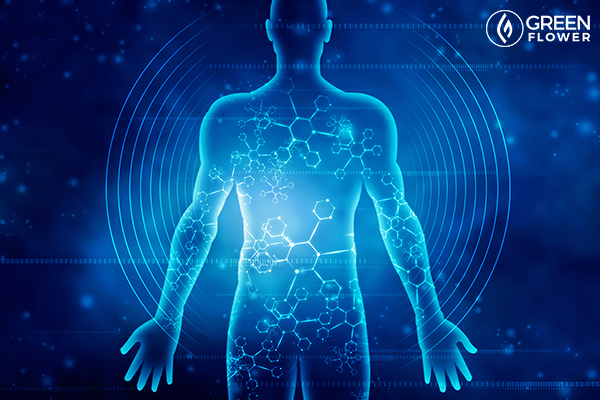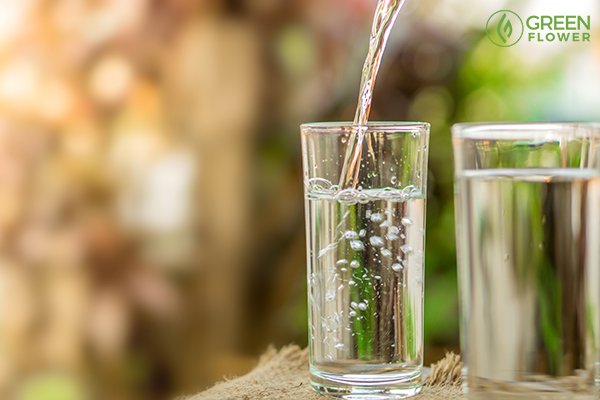Apparently, you can put CBD in just about anything.
If topical creams, candies, and flower weren’t enough, a few genius brands have figured out how to infuse CBD into water.
This is a mildly amazing feat, considering that oil and water typically don’t mix. Perhaps needless to say, a little science is necessary to unite the two together.
To successfully merge CBD in a water substance, manufacturers use a special kind of nanotechnology to emulsify CBD particles with another water-soluble compound. The result is an antioxidant-infused water with evenly dispersed amounts of CBD.
This nanotechnology was originally developed as a way to make certain kinds of medicines more effective, enhancing absorption and allowing consumers to take smaller doses of drugs.
Now, however, this same technology is being used by CBD supplement manufacturers to make it even easier to reap the benefits of the cannabis compound.
Does CBD Water Work?
There have been almost no studies on the benefits of consuming CBD water regularly.
However, scientists have conducted many different investigations on the benefits of nanotechnology for herbal medicines.
Let’s take a deeper look.
CBD is Fat Soluble

In theory, the technology used to make CBD water addresses two primary problems. The first of which is the fat-soluble nature of cannabis compounds. CBD is an oil. Found inside resin glands of the cannabis plant, the phytochemical is technically a fat.
As anyone who cooks would know, oil and water do not mix. Instead, oil often floats on top of water and the two compounds stay separate.
In order to successfully infuse CBD, you traditionally need a fat or alcohol to dissolve the cannabinoid.
The nanotechnology used to make CBD water was originally designed to address this problem. The human body is at least 70 percent water, so finding ways to make both pharmaceutical and natural medicines dissolve in water is a valuable feat.
Typically, fat-based compounds like CBD are metabolized differently than water-based nutrients.
When you eat fatty products, fat molecules do not directly enter the bloodstream.
Instead, they enter the lymphatic system where they are loaded onto larger vessels for transport to other tissues. Eventually, lymphatic vessels exchange fluids with blood vessels through capillaries.
Lymph fluid also drains into veins leading from the heart. This lymph mixture is then processed by the liver, which can spit fatty compounds back into the intestinal tract for elimination.
If all things work according to plan, the tiny water-soluble particles used in CBD water bypass this whole process.
Instead of absorbing CBD into the lymphatic system, the now water-soluble molecule is absorbed directly into the bloodstream, where it is easily delivered to organs.
More Bang for Your Buck
This easy absorption addresses the second problem with traditional CBD supplements. Edible CBD is not particularly bioavailable.
Simply stated, much of the CBD you consume is actually pulled out of the body without being processed.
Transforming CBD into a water-soluble molecule makes it easier for the body to process and absorb the cannabis compound. Theoretically speaking, at least. This means that consumers can use less CBD to achieve their desired results.
Potential Benefits of CBD Water

The natural foods movement is booming these days. From protein drinks infused with maca root and medicinal mushrooms to superfood powders you can add to your smoothies, consumers have more access to medicinal plants in supermarkets than ever before.
CBD water is one more superfood concoction to add to the mix. More than anything, CBD water is a nutritional supplement. This fortified drink may have many of the same benefits as other CBD oils and products.
However, it’s important to recognize that virtually no research has been conducted on whether or not drinking this water every day actually has any meaningful health benefits. Still, some of the potential benefits of CBD include:
Inflammation relief
There are many reasons why CBD has enormous potential value as a medicine and nutritional aid. However, one of the hottest topics in CBD research is inflammation.
Already, the compound has shown potential as a potent anti-inflammatory agent in both neurological and autoimmune conditions.
Yet, exactly how CBD reduces inflammation remains a mystery. Still, the compound is currently being investigated as an up-and-coming anti-inflammatory medicine.
Anxiety relief

If early experiments are any indication, CBD is expected to have potent anxiolytic properties. Calm and engaging, many consumers gravitate toward the cannabis compound for its ability to quell stress and promote a sense of ease.
In medical research, the compound has shown potential as an aid to those with serious mental health ailments. A phase 2 proof-of-concept trial even discovered that CBD successfully improved symptoms of both depression and psychosis in patients with treatment-resistant schizophrenia.
Of course, after decades of legal restrictions on cannabis research, there is still much left to be desired in terms of high-quality scientific data on the compound.
Antioxidant
According to a U.S. Patent on “Cannabinoids as Antioxidants and Neuroprotective Agents”, cannabis compounds like CBD may be more potent antioxidants than vitamins C and E. This is amazing, considering that antioxidants offer vital protection against both age-related and environmental damage.
While more research is sorely needed, these antioxidant properties alone may offer a very good reason to experiment with supplements like CBD water.
For the time being, however, no one really knows what impact CBD supplementation has on the long-term health.

